This newsletter is also available as a PDF
In Focus: Civil society and UNCAC review
CSO experiences with the UNCAC review mechanism, Year 1
In November 2009, a new Mechanism for the Review of Implementation of the UNCAC was approved at the 3rd session of the Conference of States Parties (COSP) in its resolution 3/1. The mechanism started up in July 2010, with 27 States parties selected to be reviewed in Year 1 of the first five-year round. Civil society organisations from Argentina, Bangladesh, Brazil, Lithuania, Morocco and Zambia report on their experience.
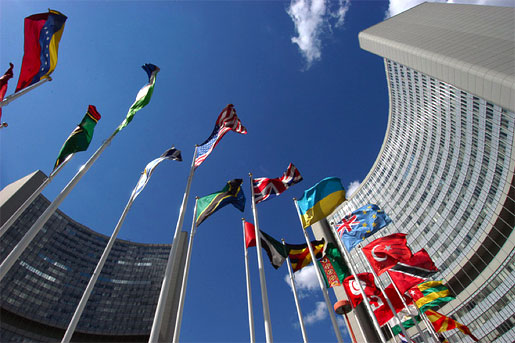
The Vienna International Centre is host to several organisations, among which the UN Office on Drugs and Crime.
Dean Calma / Flickr
1. ARGENTINA: Insufficient participation of civil society
María de la Paz Herrera and Ezequiel Nino, Asociación Civil por la Igualdad y la Justicia (ACIJ)
In Argentina, the review team did not carry out a country visit or meet with civil society representatives. Instead, the Anti-corruption Office (government focal point for the review) and the review team experts from Panama and Singapore agreed to replace this visit with teleconferences and a meeting at the premises of the UN Office on Drugs and Crime (UNODC) in Vienna.
From the civil society point of view, we can say the review was not very participatory or accessible for citizens and civil society organisations. ACIJ was able to obtain some information about the process thanks to its expertise in corruption issues and because we were monitoring the process as closely as possible. Along with other CSOs, we were invited by the Anti-corruption Office to a single meeting in August 2011, also attended by members of the Ministry of Justice, the Ministry of Foreign Affairs and the Financial Information Unit.
The purpose of the meeting, which was requested several times by ACIJ, was to inform the CSOs present about the government self-assessment exercise (timeline, meetings, procedures followed to obtain information, observations sent by experts, etc.). We learned that different public institutions were collaborating with the Anti-corruption Office and provided information to fill in the self-assessment checklist. The meeting also offered us the opportunity to transmit our views on the subjects covered in the checklist, to express our concerns on several issues and to learn about the plans for the whole process. Apart from that meeting, there were no other consultations either formal or informal with citizens’ associations.
The review was supposed to conclude in March, but as of our last information it was only finalised in September 2011 and the executive summary is not public yet. ACIJ has prepared a civil society parallel report, which is currently being edited with the assistance of TI.
2. BANGLADESH: A satisfactory review process
Iftekhar Zaman, Transparency International Bangladesh
Transparency International Bangladesh (TIB) conducted a review of Bangladesh’s implementation of selected articles of the UNCAC and prepared a CSO report. This was carried out in parallel to the Government’s self-assessment and peer review process, with the aim of providing useful inputs to the review.
We can say that the review process was conducted in a relatively transparent and cooperative manner. The government self-assessment was made available and can be consulted on the UNODC website. Moreover, in April 2011, CSOs in Bangladesh were invited to an introductory presentation by the government to the visiting peer review team. It was a fairly open forum, where apart from the peer review team (two members from reviewing countries Iran and Paraguay, together with UNODC representatives) civil society representatives had the opportunity to make comments.
In addition, Transparency International Bangladesh (TIB) was given the opportunity to host a dinner for an informal consultation with the peer review team where a useful exchange of views took place. A separate presentation of TIB’s draft parallel review report was also organised for the peer review team, in which we shared with them our findings. The presentation was also attended by the Institute of Governance Studies – the other key civil society actor working on UNCAC in Bangladesh- as well as the Government focal point. It was a very fruitful open exchange of views, leading to clarification of some key questions and concerns the review team had. On their request, we also provided the Iranian delegates some related papers.
TIB is currently finalizing a parallel review report of Bangladesh’s implementation of selected articles of the UNCAC, which will be made available on our website.
3. BRAZIL: Country visit with a happy ending
Priscila Castello Branco, Contas Abertas
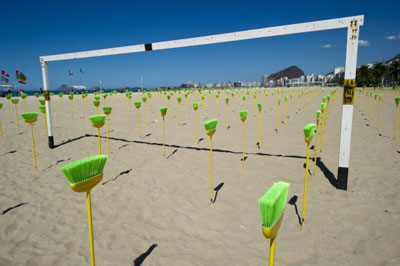
594 brooms were planted in Copacabana beach on 19 Septemer 2011 as a protest against corruption. The number of brooms represented Brazil’s 81 senators and 513 members of the Lower House, and were planted by Rio for Peace, an NGO calling for transparency in the country. Since January, four Cabinet officials have resigned on corruption allegations.
Antonio Scorza / AFP
Although they often diverge, the opinions of government officials and civil society organisations (CSOs) on the result of Brazil’s country visit in the context of the UNCAC review process seem to have converged: A happy ending. After having been trained on the steps of the review process (at a training organised by UNODC and Transparency International), we contacted our government focal point and expressed our intention to participate in the country visit. Initially, we felt a little uncomfortable when we received a copy of the government’s self-assessment only a few days before it was supposed to be finalized. However, we found it positive that it was sent to us and we then discovered that Brazil had innovated by making the government self-assessment available online.
When the time came for the country visit by the review team, not only did the government invite us, but we were also informed that government officials were “seeking the broadest possible participation of CSOs in the process”. We were happy with this commendable approach. The meeting, which included Brazilian government officials, Mexican experts, UNODC staff and five or six CSOs – one of which was working on a parallel report- was very productive. (The experts from Haiti, the other reviewing country, could not attend). We spent four hours going over some crucial issues and noticed that most of these had already been discussed between experts and public authorities in previous meetings (without the participation of CSOs). Our impression was that the experts got a very clear picture of the current scenario in Brazil and, therefore, was very well equipped to prepare a comprehensive report.
Of course we are anxious to see what the final report will look like –and if it will be published entirely or only its executive summary. Unfortunately Contas Abertas was not able to produce a parallel report. We contacted other NGOs and explained to them the review process, in the hope that some would offer their views in the format that would be possible for them (written/oral, before or during the country visit), just as we also did. As we don’t have staff with the expertise to write a legal report, we consulted with experts on some issues in order to be able to discuss them in detail during the country visit.
4. LITHUANIA: Civil society not consulted
Sergej Muravjov, Transparency International Lithuania
Lithuania was chosen to be reviewed in the first year of the UNCAC implementation review mechanism, and was also charged with reviewing UNCAC implementation compliance in Spain.
The national focal point for the review process is the Ministry of Justice, the contact details and those of the experts assigned were made public online. However, the Ministry of Justice has not published any additional official information about the review process and civil society was not officially consulted in the preparation of the self-assessment. The government self-assessment has not been published yet (but in all likelihood will be published soon, according to the Ministry of Justice).
Concerning the on-site visit, experts from Russia and Egypt made a review visit to Lithuania in September 2011. TI Lithuania was not invited to meet with the review team. Reportedly the review team only met with government officials. In addition, Lithuanian experts have already been to Spain for a country visit.
Transparency International Lithuania (TI Lithuania) is now finalizing a parallel report to provide an external insight on UNCAC implementation by the Lithuanian government. The report provides an independent analysis of the current compliance of the national legal system with the requirements of UNCAC Chapters III and IV, concentrating on potential gaps in both legislation and actual practice. It is based on information obtained from consultations with a number of experts, key sources, general statistics on the criminal situation in Lithuania and case material (data bases of the Ministry of the Interior and National Courts Administration and the search engine LITEKO providing cases material and the website of the Superior Court with its published judgments etc.). In February 2011, a representative from TI Lithuania attended a training on the review process in Vienna organised by UNODC and the Transparency International Secretariat. Last July 2011, TI Lithuania also attended the Roundtable in Vienna “On the Road to Marrakesh”.
5. MOROCCO: Between reality and discourse
Kamal Mesbahi, Transparency Maroc
Moroccan authorities have often expressed in speeches their willingness and intention to work with civil society in the fight against corruption. Thus, the Minister for the Modernization of the Public sector, responsible for the official report on UNCAC implementation, considered that “a participatory approach involving government, state institutions and civil society is necessary to eradicate this phenomenon, which exceeds the government’s responsibility”.[1]
At a first stage, the Minister had assigned the Central Agency for the Prevention of Corruption the task of dealing with the UNCAC review, and that was something that CSOs found natural. This decision was based on an official reply, by the Moroccan government, on 1 August 2008, in response to UNODC’s note verbale of CU2008/39 (A) of 29 April 2008 as follows [2]: […] “In terms of coordination, the Central Agency for the Prevention of Corruption, by its composition, is designated as the body authorized to administer international experts’ exchange and monitoring activities, sharing information and publication of their conclusions.” However, when the time came to appoint a focal point, the Minister decided on a focal point directly from his Ministry.
It should be noted that during the country review in Morocco in July 2011 by the peer reviewers from South Africa and Slovakia, Transparency Maroc was not consulted by government authorities or the experts’ team. Thus far, neither Transparency Maroc nor any other civil society organisation has been able to see Morocco’s self-assessment
Following up on earlier reports, Transparency Maroc is currently producing a parallel report on Morocco’s UNCAC implementation.
- Minister’s statement at the first meeting of the Interministerial Commission, covered by the Maghreb Arab Press Agency on January 12th, 2010.
- Please see Doha preparatory documents on United Nations Office against Drugs and Crime’s Website.
6. ZAMBIA: The review process falls short on transparency and accountability – Two versions from Jubilee Centre and TI Zambia
Rev Lawrence Temfwe, Jubilee Centre
Jubilee Centre approached the Office of the Vice-President and the Cabinet Office to express its willingness to participate in and make contributions to the government’s self-assessment process. As a response we were advised to approach the Anti-Corruption Commission (ACC), which is the main authority on matters relating to the UNCAC. We addressed a letter to them and I also spoke on the phone with the Director General.
The ACC Director General assured us that he would invite Jubilee to take part during the country visit by the experts of the reviewing countries, Zimbabwe and Italy. However, we only came to learn about their visit after they had left. So far, the Zambian government has prepared only responses to Chapter III of the UNCAC on Criminalization and Law Enforcement. In the letter the Governance Secretariat (under the Vice-President) advised us that these responses would be submitted to UNODC for further consideration.
Currently, the ACC is busy with election monitoring, as there have been corruption allegations about the company contracted by the Commission in charge of the elections, and three letters we sent to the Director General have gone unanswered. However, we are still working with TI Zambia and look forward to serving alongside TI as we empower communities in Zambia to participate in UNCAC monitoring and follow-up.
Francis Mwale, Transparency International Zambia
Transparency International Zambia (TIZ) was invited to be part of the team contributing to the government’s self-assessment of Zambia’s compliance with Chapters III and IV of the UNCAC, in a workshop held from 20 to 25 March 2011. Further, TIZ was nominated to sit on the technical committee of the UNCAC team –a committee that has never met.
The Zambian UNCAC review process was to a large extent carried out in secrecy. The initial stages of the review process were, to a large extent, kept as a preserve of the government. For instance, the Anti-Corruption Commission (ACC) unofficially complained that they had been kept in the dark as to who was the focal point for the country.
However, when it came to the actual review process, it is true that some civil society organisations were involved. During the country visit agreed by the government that was undertaken by peer reviewers from Italy and Zimbabwe in July 2011, TIZ was one of the institutions visited by the experts to get our input. But we could not find information on how many other institutions, especially from civil society, were also visited.
TIZ has prepared a parallel review report for Zambia, which was sent for feedback to the Transparency International Secretariat on 14 September 2011. The worrying scenario as things stand now is that the official report generated from the review process has thus far been kept exclusively within government circles without any efforts to share it with other stakeholders like civil society – and this despite several requests by civil society organisations that government share at least the draft report.
The IRG suspends NGO participation again
Gillian Dell, Transparency International Secretariat
The UNCAC Implementation Review Group held its resumed 2nd session at the UN in Vienna on 7–9 September 2011, with John Brandolino of the US as Chair. (The IRG oversees the UNCAC review process.) Once again civil society representatives had to remain outside in the hallway, despite an opinion issued by the UN Legal Office that they should be let in as observers. This situation was a topic of heated informal consultations among government delegations on the margins of the meeting. In the “informals” chaired by the Egyptian delegation, governments on the two sides of the issue too now-familiar positions on admission or exclusion of NGOs. UNCAC itself explicitly recognises in Article 13 and elsewhere that anti-corruption efforts must go hand-in-hand with transparency and civil society participation, but some governments continue to reject this notion.
Disputes over transparency and public participation in UNCAC fora have a long history. They surfaced already at sessions of the Conferences of States Parties and at the IRG’s very first meeting back in June 2010 leading the IRG to consult the UN Legal Office. The resulting Legal Opinion in August 2010 found that NGOs could participate as observers at IRG plenary sessions under the same procedural rule (Rule 17) as applied to the sessions of the Conference of States Parties (COSP). This could only be overruled by a decision of the COSP.[1]
Surprisingly, NGO observers were still not permitted to attend the following IRG meeting in November 2010. According to the Secretariat report on that meeting, the IRG had the understanding that “this decision would not set a precedent and that every effort would be made before and during the second session of the Group to explore appropriate and practical solutions for submission to and consideration by the Conference at its fourth session.”
But at the 2nd session of the IRG in June 2011 nothing had changed – NGO representatives were still barred from the meeting and there was no movement in positions. Then at the latest IRG meeting in September 2011, the Russian delegation reportedly circulated a discussion paper that called for NGOs to be invited only to a “special briefing and dialogue” on the final day of IRG meetings where they could ask questions, engage in dialogue with the co-chairs and provide comments in writing. This slim offer was rejected by those countries pushing for NGO participation in the spirit of UNCAC Article 13 and respecting COSP Rule 17, the most vocal being several Western European countries. They were unwilling to sacrifice the principles of transparency, accountability and participation that are at the heart of the UNCAC. The issue will now be referred for a decision at the fourth session of the Conference of States Parties in Marrakesh, Morocco in October 2011.
What else happened at the meeting? There was a discussion of the fact that most countries under review were far exceeding the indicative timeline for the process -some reviews are taking over a year. The IRG also decided to continue its meeting during the upcoming 4th session of the COSP in Marrakesh, in order to consider the thematic implementation reports on Chapters III and IV and possibly make recommendations to the Conference.
On the question of technical assistance, the IRG considered a UNODC report outlining a three-tier approach and an Argentine proposal on related issues. The budget for the Review Mechanism and IRG-related work was also a topic for discussion, with a proposed increase in funding from the regular budget for the coming year. This might be a controversial topic at the COSP if some governments oppose increases or prefer to make voluntary contributions.
Ahead of the IRG meeting, UNODC had posted on their website the executive summaries of the reviews of Mongolia and Uganda, bringing to four the number of executive summaries that have been placed online. The other two, for Finland and Spain, were posted online in June. The Coalition is calling for governments to agree to online publication of the full review reports, as well as the focal points and review schedules, but this has yet to take place.
- See the UNCAC Coalition’s November 2010 “Call for the UNCAC Implementation Review Group UNCAC States Parties and UNODC to ensure a transparent and participatory UNCAC review mechanism“
Anti-corruption special topics
Corruption and climate change: time to get serious
Alice Harrison, Transparency International Secretariat
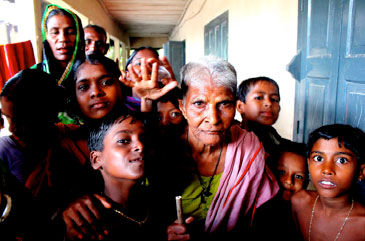
TI Bangladesh visits a community of climate refugees. With no homes to return to they have set up camp in an old school building in the southern Khulna district.
Alice Harrison
In mid-August the trial began of six people accused of evading more than 200 million euros in taxes on Europe’s carbon market. This is one of many scandals the EU carbon market has suffered since its launch in 2005, which include the false issuance of permits, and the theft and recycling of carbon credits.
It doesn’t end there. Carbon markets are just one facet of multi-billion dollar global efforts to adapt or mitigate the effects of our changing climate. From reforestation schemes, to coastal defence construction, to the development of wind parks, these projects are often characterised by opaque decision-making and spending, making them vulnerable to corrupt abuse.
Corruption like this puts the future of our planet in jeopardy. It is not being taken seriously enough. With the UN’s next annual climate conference just around the corner, we need to send a strong message that good governance structures must be built into climate finance and policy. In Durban, Transparency International’s Climate Governance Integrity Programme will be calling for public and private sector climate finance actors to commit to implementing and enforcing integrity rules and legally binding anti-corruption standards. We also want civil society, especially affected communities, to play a greater role in participating in and monitoring climate policy development and implementation.
Please help us raise awareness about integrity challenges in climate governance. You can find out more about our project here.
A robust UN Arms Trade Treaty needs strong anti-corruption provisions
Tobias Bock, Transparency International UK
Though there are international treaties to control the sale of many goods, from dinosaur bones to postage stamps, there is no such treaty to control the trade in weapons worldwide. Since 2010, the 193 member states of the United Nations have been negotiating towards an “Arms Trade Treaty” (ATT) to regulate the legal global trade in arms. Expected for the summer of 2012, the treaty should ensure, as mandated by a UN resolution, “the highest possible common international standards for the transfer of conventional arms”. It is essential that corruption is tackled within these standards.
The arms trade is one of the most corruption prone sectors – up to £20 billion ($31 billion) each year are lost to corruption. Numerous cases demonstrate the devastating impact that defence corruption has on sustainable development, public trust in the government and its armed forces, as well as the ability of nations to pay a fair and uninflated price for the weapons they acquire to defend themselves.
In 2011, progress has been made, and a robust ATT with strong anti-corruption measures received support from 21 large institutional investors, collectively representing assets over $1.2 trillion; the defence industry; and many States at the UN, including the 15 member states of the ECOWAS, the EU-27 (also speaking on behalf of neighbouring states such as Turkey and Albania), and states from all around the world such as Bangladesh, Costa Rica, Malawi, Mexico, Jamaica, and Trinidad and Tobago.
It is imperative that this positive momentum is maintained to ensure that the final ATT in 2012 does include strong anti-corruption provisions. If you want to learn more about how you can work with over 100 civil society representatives towards this goal, please contact Tobias Bock.
UNCAC Coalition at work
Joint Civil Society Call to the G20 Anti-Corruption Working Group
Angela McClellan, Transparency International – Secretariat / Robert Palmer, Global Witness
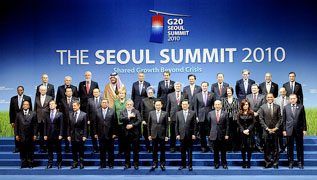
UN Secretary-General poses with participants of G20 Summit in Seoul, Republic of Korea, 12/11/2010.
UN Photo / Evan Schneider.
As a follow-up to the February Joint Civil Society Submission, which included recommendations on all 11 action areas of the G20 Anti-Corruption Action Plan, TI and Global Witness coordinated another submission prioritising four key areas which we believe can and should be achieved at this year’s G20 Summit in Cannes, France on 2 – 4 November. These areas include anti-bribery laws, facilitation of stolen asset recovery, enforcement of anti-money laundering regulation and denial of visas to corrupt officials.
The Arab Spring has highlighted the disastrous and destabilising impact of the abuse of entrusted power for personal gain. Furthermore, the freezing of allegedly stolen assets from Mubarak, Ben Ali and Gaddafi by banks in the UK, France, Germany and Switzerland underlined the responsibility of G20 countries to enforce anti-money laundering regulations and Know Your Customer policies, if they are serious in preventing the proceeds of corruption from finding a safe haven in their banking systems. There should be no impunity for those who wield power for their own benefit and not for their people.
The Anti-Corruption Action Plan, which is based on the UN Convention against Corruption, would make a big difference when fully implemented. It mandates international cooperation in preventing illicit flows into G20 financial markets and in tracing and recovering stolen assets. It also calls for criminalisation and prosecution of foreign bribery, measures to prevent corruption in the public sector and enhanced protection of whistleblowers, which have long been requests from civil society and anti-corruption fighters. The UN Convention against Corruption has been ratified by all but three G20 countries. The laggards are Germany, Japan and Saudi-Arabia.
Coalition Statements on Asset Recovery and Article 13
The UNCAC Coalition has agreed on two Statements that will be sent to UNODC as submissions for the 4th COSP.
The first Statement concerns UNCAC Article 13 and -as the sub-title reads- seeks to remind that “Transparency and Public Participation in UNCAC Implementation and Monitoring are Key to Success”. The Coalition therefore calls on the Conference of States Parties to the UNCAC to adopt a resolution at its 4th Session urging parties to reaffirm their commitment to UNCAC Article 13 and related provisions and to the practices of transparency and participation. As a matter of fact, transparency and civil society participation are not being ensured by all UNCAC States Parties and not always followed by States under review in the UNCAC review process. The Coalition urges governments to advance on such issues as: access to information laws fully enforced; information about UNCAC, the review process and government anti-corruption measures is widely publicised and accessible; the public is able to participate in anti-corruption efforts and input into monitoring processes, etc.
The second Statement is a call for improving asset recovery efforts and for countering laundering of corruptly taken assets. As the fourth Conference of State Parties to the UNCAC convenes in Marrakesh, Morocco, and people throughout the Arab world struggle to get back their countries’ stolen funds, the UNCAC Coalition calls on States Parties to adopt resolutions to fulfil their commitment to Chapter V by removing barriers to asset recovery and improving their anti-money laundering efforts in practice.
Ahead of COSP 4
Preparing COSP 4
Gillian Dell, Transparency International – Secretariat
The 154 parties to the UNCAC will meet for the 4th session of the UNCAC Conference of States Parties, from 24 to 28 October 2011 in Marrakesh, Morocco. Over 500 government delegates are expected at this global anti-corruption summit, from Foreign, Justice, Interior, Trade, and Development Ministries as well as from Anti-Corruption Agencies, Attorneys General offices and Public Prosecutors offices. Attending as observers will be representatives of specialised agencies and intergovernmental organisations like the World Bank, the OECD and Interpol and about 100 representatives of civil society organisations. Also expected are representatives of the Global Organisation of Parliamentarians against Corruption (GOPAC).
The participants will be discussing progress in implementing UNCAC and countering corruption globally. There will be a spotlight on the experience of the first year of the Convention’s review process that started in June 2010, as well as on funding needs of the Review Mechanism. Attention will also be focused on how much progress there has been in asset recovery efforts, in light of UNCAC provisions on that subject. Also on the agenda are issues relating to corruption prevention. To guide future work, government delegates will adopt forward-looking resolutions aimed at making UNCAC an effective framework for collective action against corruption.
The UNCAC Coalition will be there in force to remind governments of our message: “Be accountable. Be inclusive. Go public.” With the Arab spring developments in mind, we will also call for action to step up anti-money laundering and asset recovery efforts, with the message: “Return stolen public assets now!”.
At a series of events before and during the Conference, the UNCAC Coalition will call for transparency and civil society participation, for removal of barriers to asset recovery, for respect for human rights and dignity and for an end to impunity. These include Special Event panels on key topics (See the main events at the COSP Week Schedule below). Additional, special meetings and parallel events organised by other groups will be held such as a 2-day meeting on “Citizen participation to improve accountability and fighting corruption in public services” hosted by UNDESA; a meeting organised by UN Women on “Gender and Corruption: Impact, Prevention and Responses”; and a Private Sector Forum co-organised and hosted by TI, the ICC, the World Economic Forum and the UN Global Compact. The International Association of Anti-Corruption Authorities will meet as well just before the COSP.
» To get an idea of what the Coalition does at a COSP have a look at the video collection: Scenes from a Global Anti-Corruption Summit.
4th CoSP Week Schedule for civil society organisations
(a partial list of meetings)
23 October 2011
- UNCAC Coalition Coordination Committee Meeting: Planning for the COSP
- Civil Society Preparatory Meeting: Pre-session briefing for NGOs organised by the UNCAC Coalition; UNODC will participate to provide information and guidance for CSO delegates
24 October 2011
- Opening of CoSP, Coalition participation as observers
25, 26, 27 October 2011
Three-part Special Event organised by Coalition members for government representatives, fractioned in the following three meetings:
- 25 Oct.: Best Practices in UNCAC Review and Access to Information
- 26 Oct.: Best Practices in Article 13 and Whistle Blower Protection
- 27 Oct.: Best Practices on Asset Recovery and Anti-money laundering
27 October 2011
- Coalition workshops and internal discussions
- 1st UNCAC Coalition Annual Membership Meeting: a historic first in-person Coalition membership meeting
28 October 2011
- CoSP 4th session ends
What happened at CoSP 3?
Ana Revuelta, Transparency International – Consultant
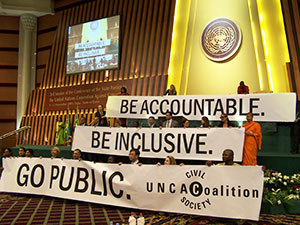
UNCAC Coalition civic action, Doha 2009
Over 100 civil society representatives from all over the world attended the 3rd session of the UNCAC Conference of States Parties held in Doha, Qatar, from 9-13 November 2009.
Most of them were part of the UNCAC civil society Coalition which engaged actively with government delegates during the Conference under the slogan: “Be accountable. Be inclusive. Go public.”
The Coalition’s main target at the 2009 CoSP was to ensure the adoption by UNCAC states of a robust, transparent and inclusive review mechanism for the Convention. For that, we carried out intensive activity prior to and during the CoSP. We organised informative and very visible actions; published a daily printed bulletin as well as blogs and press releases in several languages; and held meetings with government delegates and press conferences.

Government delegates to the 3rd CoSP were called to give the UNCAC teeth.
Courtesy of Global Witness
After government negotiations, accompanied by our civil society pressure, a major step was finally taken in Doha with the adoption of an Intergovernmental Review Mechanism for the UNCAC via Resolution 3/1. Three other resolutions were adopted by States Parties, concerning in particular the creation of an Intergovernmental Working Group on Prevention (Resolution 3/2), the continuation of the Intergovernmental Working Group on Asset Recovery (Resolution 3/3), and on Technical assistance (Resolution 3/4).
Research and publications
UNCAC Coalition training video
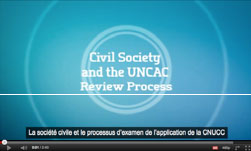
The UNCAC Coalition and its secretariat Transparency International are pleased to announce the launch of a new six-part collection of animated training videos about the UNCAC review process and how civil society can take part in it.
Available online on the Coalition Review page of this website, the short videos cover the topics: Introduction to the UNCAC and the review process; Review Actors; Review Process and Tools; Civil Society Participation; and The Civil Society Report.
Feel free to share them on Twitter, Facebook and embed them on your website. Versions with Spanish and French subtitles will be ready soon. Check them out here!
UNCAC Legal Library: New Database of Anti-Corruption Legislation
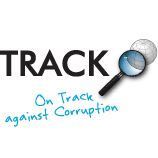
UNODC has launched a web-based anti-corruption portal known as TRACK (Tools and Resources for Anti-Corruption Knowledge). The portal features the Legal Library on the UNCAC, providing a gateway to an electronic database of legislation and jurisprudence relevant to UNCAC from over 175 States systematized in accordance with the requirements of the Convention.
The TRACK portal brings together legal and non-legal knowledge on anti-corruption and asset recovery. Information in the Legal Library is searchable by country, by UNCAC article and other criteria such as legal systems and levels of human development.
An anti-corruption learning platform is also incorporated, providing a common space where analytical tools generated by partner organisations can be searched and accessed by users worldwide. A further key objective of TRACK is to create a community of practice where registered users can communicate, exchange information and schedule events. The common workspace is intended for partner institutions, anti-corruption practitioners and experts to communicate and collaborate directly with each other (Source: UNODC website).
About us
The UNCAC Coalition is a global network of over 310 civil society organisations in over 100 countries, committed to promoting the ratification, implementation and monitoring of the United Nations Convention against Corruption.
For this purpose, we mobilise civil society action at international, regional and national levels.
Comments? Submissions?
We’d love to hear what you have to say and to receive your contributions for the newsletter. Email us at info@uncaccoalition.org.
Credits
The UNCAC Coalition Newsletter is produced by the Anti-corruption Conventions team at the TI Secretariat, with consultants Ana Revuelta and Kai Chan.
An Editorial Committee supervises the publication, composed by: Gillian Dell, Andrea Figari, Milton Ponson, Inés Selvood, Elina Zubaidy.
The UNCAC Coalition Newsletter is funded by the UN Democracy Fund (UNDEF).



